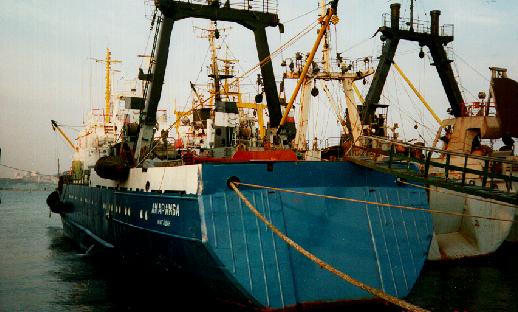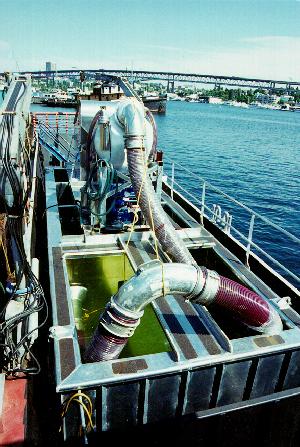|
| |
![[Maritime Week / Bell Street Pier]](graphics/maritime.gif)
|
|
| |
![[Maritime Week / Bell Street Pier]](graphics/maritime.gif)
|
MRCI, a U.S.-Russian joint venture celebrating its 20th anniversary, specializes in marketing of Russian-origin seafood products, and the management, conversion, repair and refit of Russian vessels.
The company grew out of a partnership between Talbot Investment Company of Seattle and the Soviet Ministry of Fisheries. Russian vessels began fishing the North Pacific in the 1950s. But in 1976, the U.S. established a 200-mile exclusive economic zone off the North American coast. The zone strictly controlled foreign fleets' access to U.S. fishing stocks.
The zone effectively sank the Russians' huge Pacific fishing fleet, until Talbot saw a joint venture opportunity: with American catch boats, observers and vessel management, Russian processing ships could continue harvesting within the zone. MRCI was formed, and within a year had opened its first office in the Russian Far East.
 |
| MRCI is currently refitting the Russian ship Amaramba, which is scheduled to be completed shortly. |
This continued to be MRCI's core business until 1991, when the full "Americanization" of the fishing effort closed the zone to foreign participation. Building on relationships with Russion vessel owners and exporters developed during the early years, MRCI shifted its focus to seafood marketing, vessel refit and repair and vessel management that is its foundation today. In addition to its maritime specialties, MRCI has also actively represented the commercial interests of U.S. and Canadian timber equipment manufacturers in Russia since 1986.
Given the small success rate of U.S-Russian joint ventures started in the turbulent years since 1976, it is something of an achievement that MRCI is celebrating its 20th year of business. It is not only one of the oldest and most stable joint ventures, it is thriving and growing, with annual revenues over $100 million.
Its Seattle office, headed by General Manager Tony Allison, is staffed by 31 Americans, most of whom are bilingual. Offices in Moscow, Vladivostok, Yuzhno-Sakhalinsk and Petropavlovsk-Kamchatskiy employ a combined 25 Russian nationals. This year, MRCI will open an office in Pusan, South Korea.
 |
| Workers will soon install this fish pump in The Raven, an American ship being sold to the Russians. |
A further boost came earlier this year when MRCI was awarded a $6.25 million financing package from The U.S. Russia Investment Fund (TUSRIF). The TUSRIF investment, which made the private investment firm one of three owners of MRCI, help finance Russian fishing companies' efforts to modernize their vessels, and facilitate the transfer of Western fishing skills and technologies.
The refit and repair activities have created jobs in the U.S., as much of the work is done in Seattle. MRCI vessel refits supply Russian shipowners with turnkey systems for catching and processing premium-grade seafood products such as crab, salmon, cod, pollock, halibut, scallops and other species.
MRCI has done approximately 35 modernizations of Russian vessels since 1991, far more than any other U.S. company. Each conversion takes less than 45 days. Upon completion of installation and testing, MRCI sends qualified technicians on the first voyage to train the crew.
The company also contributes to humanitarian causes in Russia, including earthquake and typhoon relief funds. It also sponsors an annual exchange of youth baseball teams --this year, a team from Sakhalin Island will visit, play exhibition games and participate in skill development camps. The visit will be in late June and early July, to coincide with MRCI's 20th anniversary celebrations.
 Return to Maritime Week / Bell Street Pier top page
Return to Maritime Week / Bell Street Pier top page